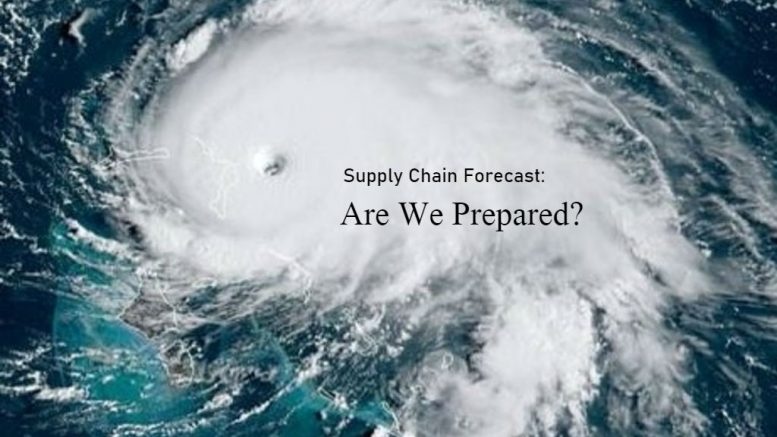Hurricane Dorian Raises Questions about Healthcare Supply Chain Preparedness
Hurricane Dorian’s US-mainland near miss last week brought back dreadful memories of the toll hurricanes had on US healthcare when, in 2017, Puerto Rico was devastated and without power for nearly eleven months. As this is just the start of the hurricane season, how prepared is the healthcare supply chain to weather a major storm this year?
“A lot has been done across the industry since 2017 to mitigate the impact of a major storm and natural disasters of all types,” said Chaun Powell, Vice President of Strategic Supplier Engagement at Premier Inc.
When Hurricanes Maria and Irma rocked Puerto Rico in 2017, more than 100 suppliers based on the island were virtually shut down, several for months. Hospitals across the U.S. faced shortages of IV bags for up to five months. Eleven of the top 20 medicines sold worldwide, including insulin, had components that were only produced in Puerto Rico. The supply chain was in turmoil, and the devastation left many providers scrambling to provide appropriate care.
“Those storms were clearly a wake-up call, bringing to light the fact that we, as a nation, needed greater diversification in our supply chain,” added Powell.
Premier is a healthcare improvement company and ranks among the top three Group Purchasing Organizations (GPOs). Like all GPOs, Premier helps its members provide the best possible care at the lowest costs through group purchasing and deep insights about the healthcare supply chain.
Over the last few years, Premier has put in place advanced analytics and vendor logistics, right down to the raw material level, an effort it says helps to manage and create balance in the supply chain so its 4,000 acute care provider members as well as its 165,000 non-acute members are prepared for natural disasters. Through this effort, Premier has details about where supplies, as well as the raw materials to produce them, are sourced and stored. They aim to proactively identify the ripple effect a storm will have across the entire nation.
Last week, when it looked like Hurricane Dorian would be a major weather event for a broad swath of the Southeastern United States, GPOs were swinging into action, closely tracking what impact this could have on our healthcare supply chain, as well as what needed to happen to ensure as little disruption to providers as possible.
“There is an old adage: An ounce of prevention is worth a pound of cure,” said Chaun Powell, Vice President of Strategic Supplier Engagement at Premier.
Premier began preparation as soon as Dorian was predicted.
“At first, we worked closely with 126 suppliers in Florida and another 70 in Georgia, who were predicted to be in the direct path of the monster storm,” Powell said.
As Dorian continued up the US east coast, Premier was working to ensure that the industry would be prepared in the event of a devastating landfall.
“We tracked any impact Dorian might have had on members as well as suppliers in the Carolinas and then, further up the coastline as the storm continued, just to make sure that if even one supplier is victim to some sort of disruption, we can initiate established backup plans and our members are not impacted,” Powell explains.
Disaster preparedness has been transformed since 2017.
Powell adds, “There is an old adage: An ounce of prevention is worth a pound of cure. Any work we can do on behalf of our membership, especially once storms are declared, certainly allows them to stay focused on patient care, while we remain a step ahead to protect their supply chain whenever possible.”
As we brace for the impact of this and other storms, emergency plans for supplies and rebuilding are in place. GPOs know where healthcare supplies will be impacted and have emergency plans that will save lives. We can never control when another storm will hit, but we can ensure a more stable future for healthcare.

